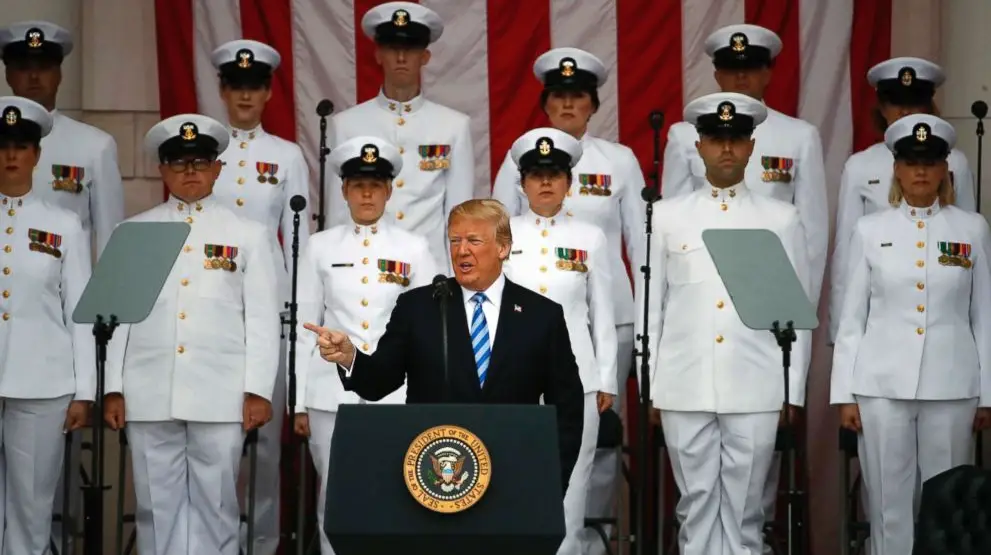In politics, anniversaries often serve to build or reinforce narratives that help shape a community—either society at large or a particular state of affairs. These are holidays where the break from work is filled with official declarations and public events meant to stir local or national pride. They are moments to reclaim the past and envision the future, days that carry a distinct tone of solemnity and transcendence. Some of them cross borders to acquire universal meaning. That’s the case of July 4 and July 14, which have moved beyond their U.S. or French origins, or May 1, which carries a very different yet similarly global resonance.
During his Memorial Day speech, Donald Trump emphasized that there would be a grand celebration on July 4, 2026, to commemorate the 250th anniversary of the United States. He pointedly remarked, “In some ways I’m glad I missed that second term where it was because… [laughter] I wouldn’t be your president for that. Most important of all, in addition, we have the World Cup and, in 2028, we have the Olympics in Los Angeles” He concluded: “Can you imagine? I missed that four years and now look what I have, I have everything. It’s amazing how things work out. God did it; I believe that too. [Applause]. God did it.”
But that’s next year. What will the U.S. president highlight in 2025, just five and a half months after taking office on January 20, and after delivering an inaugural speech in which he mentioned Panama six times? Let’s focus on three aspects of what has transpired in that short time span: domestic developments in science, regional (dis)order in the neighborhood, and his relations with former European allies. These topics help outline a unique map of this particular 4th of July.
In May, an article in The Economist reported that since Trump’s return to the White House, around $8 billion in funding had been cut or withdrawn from U.S. scientists and research institutions. That figure amounts to roughly 16% of the annual federal grant budget for higher education. An additional $12.2 billion in funding had also been rescinded, though court orders have since reinstated some of those grants. The National Institutes of Health (NIH) and National Science Foundation (NSF) canceled over 3,000 previously approved grants, according to Grant Watch, a monitoring site run by academics. Many others were reportedly dropped by the Departments of Energy and Defense, among others. Most of the cancellations targeted research disliked by Trump and his administration—projects tied to diversity, equity and inclusion (DEI), climate change, disinformation, COVID-19, and vaccines. Others affected studies conducted at elite universities. As a result, U.S. scientists’ applications for jobs abroad have risen by a third compared to the previous year, while foreign scientists applying to work in the U.S. have dropped by 25%.
Zhu Jingyang, China’s ambassador to Colombia, recently made a sarcastic jab in La Silla Vacía, saying: “The current president of the United States has a nickname on our social media. We call him ‘comrade,’ because he’s helping us build our nation. He’s doing his country quite the favor in his quest to ‘Make America Great Again.’ No—he’s helping others become great.” Beyond the snark, Trump has deeply strained ties with Latin American countries—setting aside Cuba, Nicaragua, and Venezuela—that once maintained close cooperation with the U.S., including Colombia, Mexico, and Panama, while distancing himself from Brazil and Chile. By contrast, he has built strong friendships only with Argentina, Ecuador, and El Salvador.
Relations with America’s traditional European partners are also facing complications. Beyond disputes over trade tariffs and the ongoing conflicts in Ukraine and the Middle East, Trump’s insistence on higher defense spending commitments has sparked tensions with unpredictable consequences. The Spanish government, led by Socialist Prime Minister Pedro Sánchez, has openly challenged Washington’s demand that NATO countries allocate 5% of their GDP to defense.
Without a unified European defense policy, Trump’s push for higher military spending seems arbitrary—an imposition disguised as burden-sharing that ignores the indirect benefits the U.S. reaps from the European market. Moreover, as highlighted during the Fourth International Conference on Financing for Development held in Seville, diverting funds from global development efforts to military budgets at a time of global rearmament is arguably the worst path forward as global stability is also decided in the Global South.
*Machine translation proofread by Ricardo Aceves.













